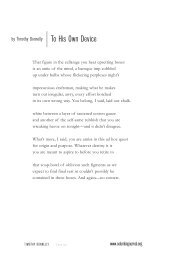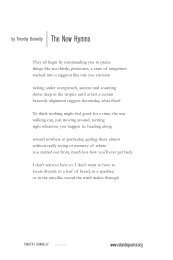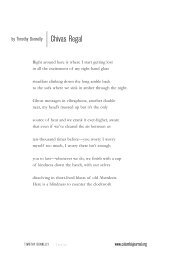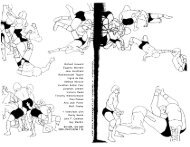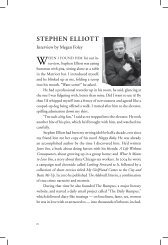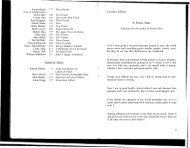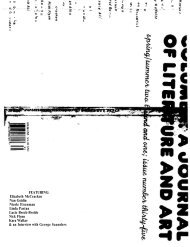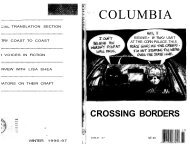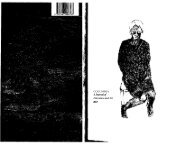Issue 3 - Columbia: A Journal of Literature and Art
Issue 3 - Columbia: A Journal of Literature and Art
Issue 3 - Columbia: A Journal of Literature and Art
You also want an ePaper? Increase the reach of your titles
YUMPU automatically turns print PDFs into web optimized ePapers that Google loves.
also describe my high school years <strong>and</strong> my fascination<br />
with heresies <strong>and</strong> with dualities that you mentioned,<br />
which originated when I was a schoolboy. But I mention<br />
by name various friends <strong>of</strong> my youth, <strong>and</strong> so it would<br />
be very difficult to underst<strong>and</strong> without notes.<br />
C: What do you think has been lost in translation <strong>of</strong> your<br />
work?<br />
M: That is the great obstacle, the historical references.<br />
C: We noticed in your Selected Poems that credit is<br />
given for all the translations except 'The Raja'. Is that the only<br />
thing you have ever written in English?<br />
M: I guess it's the only thing. It was written in the<br />
form <strong>of</strong> a letter.<br />
C: We were fascinated by that because you have done so<br />
much translation from Polish to English, <strong>and</strong> from Hebrew to<br />
Polish. When you write, do you still write in Polish?<br />
M: Only in Polish. I feel no temptation to write in<br />
English because I am so rooted in one language. My<br />
poems in English would be poorer, they would be without<br />
that multifaceted character, without allusions. In<br />
the history <strong>of</strong> the Polish language there were bilingual<br />
poets, but in another language they were usually<br />
weaker, one-leveled, while they were multi-leveled in<br />
Polish. Of course, there were cases where they were<br />
better in other languages. There is a Polish writer who<br />
was brought up in German schools. He wrote German<br />
<strong>and</strong> his German writings are better than his Polish<br />
work. That is a question <strong>of</strong> the language in which one is<br />
brought up. My French cousin spoke very fluent Polish<br />
yet didn't consider himself a Pole, but a Lithuanian. He<br />
wrote only in French; that was his language <strong>of</strong> expression.<br />
He never could write in any other language.<br />
C: The idea <strong>of</strong> persona comes up many times in your<br />
poems. When writing in English, do you feel freer to create a<br />
persona, a very identifiable one from which to speak?<br />
M: I don't know. To be frank, I haven't given much<br />
thought to the idea <strong>of</strong> writing in English. It seems to me<br />
that writing in Polish gives me enough trouble. There is<br />
something here I would like to read to you—<br />
82<br />
'Hypothesis': "If, she said, you wrote in Polish to<br />
punish yourself for your sins, you will be saved" [Bells<br />
In Winter].<br />
C: Have you worked with young writers at Berkeley?<br />
M: Young writers in Berkeley? No, no. In the sense<br />
that I never taught any creative writing. Some young<br />
people with literary ambitions pr<strong>of</strong>ited from our seminars<br />
<strong>and</strong> I also pr<strong>of</strong>ited from their participation. I gave<br />
seminars in translation so we would sit down <strong>and</strong> together<br />
translate poems from Polish into English, occasionally<br />
from Russian into English, <strong>and</strong> I used the technique<br />
I learned when I was a high school student. I am<br />
very much indebted to my high school; that is why I am<br />
horrified by the situation in this country at the high<br />
school level, because you have to learn everything later<br />
on.<br />
C: That has become very obvious to us.<br />
M: But we had a very good Latin teacher, with<br />
whom we translated Ovid in a very democratic way. He<br />
would give his version, a line, <strong>and</strong> then say: "Now,<br />
who wants to improve? You suggest this, all right, let's<br />
read it—how does it sound? What do you think about<br />
the improvement? No good? Let us try another solution<br />
..." And so on. So I would bring my translation to<br />
class, <strong>and</strong> then ask the students' opinion, <strong>and</strong> we would<br />
work together on a given line, line by line in the poem.<br />
Some <strong>of</strong> the students pr<strong>of</strong>ited, <strong>and</strong> I pr<strong>of</strong>ited from<br />
teaching them. Largely, the result <strong>of</strong> those seminars is<br />
my anthology <strong>of</strong> Postwar Polish Poetry.<br />
C: Relative to our situation in this country, you have<br />
written in isolation without a large community <strong>of</strong> people<br />
around you doing the same thing. Do you have any thoughts<br />
on that?<br />
M: Let us first distinguish ... I lived in a community<br />
as long as I was in Pol<strong>and</strong>. The communal character<br />
<strong>of</strong> literary life was ten times stronger than in America. It<br />
was very strong before the War, but it was also strong<br />
during the War, <strong>and</strong> even stronger after the War, because<br />
during the War there existed the world <strong>of</strong> the<br />
Underground. It was a compact community, everybody<br />
83



